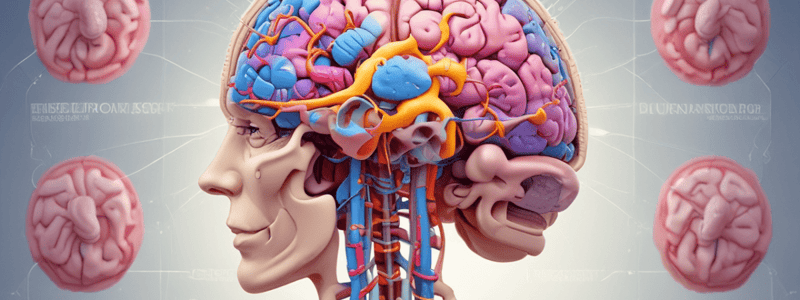Podcast
Questions and Answers
What percentage of the body's oxygen does the brain consume?
What percentage of the body's oxygen does the brain consume?
- 15%
- 25%
- 20% (correct)
- 10%
What is the primary source of energy for brain cells?
What is the primary source of energy for brain cells?
- Proteins
- Fats
- Vitamins
- Glucose (correct)
What happens to brain cells in hypoglycemic conditions?
What happens to brain cells in hypoglycemic conditions?
- Enhanced function
- Increased oxygen consumption
- Improved coordination
- Loss of consciousness (correct)
Which nerve is responsible for facial expressions and taste over the anterior two-thirds of the tongue?
Which nerve is responsible for facial expressions and taste over the anterior two-thirds of the tongue?
What is the consequence of a lack of oxygen for as little as 10 seconds?
What is the consequence of a lack of oxygen for as little as 10 seconds?
Which cranial nerve is responsible for elevation of the pharynx in swallowing?
Which cranial nerve is responsible for elevation of the pharynx in swallowing?
What is the consequence of a lack of oxygen for 5 to 6 minutes?
What is the consequence of a lack of oxygen for 5 to 6 minutes?
What type of neuron is found in the olfactory nerve?
What type of neuron is found in the olfactory nerve?
Which area of the brain do the majority of cranial nerves have their origin?
Which area of the brain do the majority of cranial nerves have their origin?
In which part of the brainstem do the terminal portions of the cranial nerves originate?
In which part of the brainstem do the terminal portions of the cranial nerves originate?
What is the function of cranial nerves in sensing changes in circulation and intracranial pressure?
What is the function of cranial nerves in sensing changes in circulation and intracranial pressure?
If an individual has a right cerebral hemisphere stroke, which side of the face would be affected by a facial droop?
If an individual has a right cerebral hemisphere stroke, which side of the face would be affected by a facial droop?
What is a common cause of cranial nerve abnormalities?
What is a common cause of cranial nerve abnormalities?
Which pair of cranial nerves are numbered from I through XII?
Which pair of cranial nerves are numbered from I through XII?
What is the primary type of transmission carried out by cranial nerves?
What is the primary type of transmission carried out by cranial nerves?
Flashcards are hidden until you start studying
Study Notes
Cerebral Metabolism
- The brain is the most energy-consuming organ, using 20% of the body's oxygen.
- Brain cells solely use glucose to function and require a continuous supply of oxygen and glucose.
- Hypoglycemic conditions can cause brain cells to dysfunction, leading to loss of consciousness.
- Lack of cerebral blood flow causes cerebral hypoxia, which can cause irreversible brain damage.
- A lack of oxygen for as little as 10 seconds can cause loss of consciousness, and 5-6 minutes can cause brain cell death.
Cranial Nerves
- There are 12 pairs of cranial nerves, numbered from I to XII, which arise from the brain and travel to the head, face, neck, and shoulders.
- Cranial nerves can be either motor, sensory, or mixed (both motor and sensory).
- They are sensitive to changes in circulation and intracranial pressure, and can become dysfunctional in conditions such as stroke, tumor, or brain injury.
- Cranial nerve dysfunction can indicate a disturbance on the opposite side of the brain.
- Cranial nerves can act as antennae, sensing changes in intracranial pressure.
Individual Cranial Nerves
- I. Olfactory: responsible for smell
- II. Optic: responsible for vision
- III. Oculomotor: responsible for extraocular movements and pupil response
- IV. Trochlear: responsible for extraocular movements
- V. Trigeminal: responsible for facial sensation and masseter muscle control of chewing
- VI. Abducens: responsible for extraocular movements
- VII. Facial: responsible for facial expressions and taste over the anterior two-thirds of the tongue
- VIII. Auditory or Vestibulocochlear: responsible for hearing and equilibrium
- IX. Glossopharyngeal: responsible for elevation of pharynx in swallowing, taste over the posterior one-third of the tongue, and salivation
- X. Vagus: responsible for gag reflex and parasympathetic control of the body
- XI. Accessory: responsible for turning the head and shrugging
- XII. Hypoglossal: responsible for tongue movement
Studying That Suits You
Use AI to generate personalized quizzes and flashcards to suit your learning preferences.




